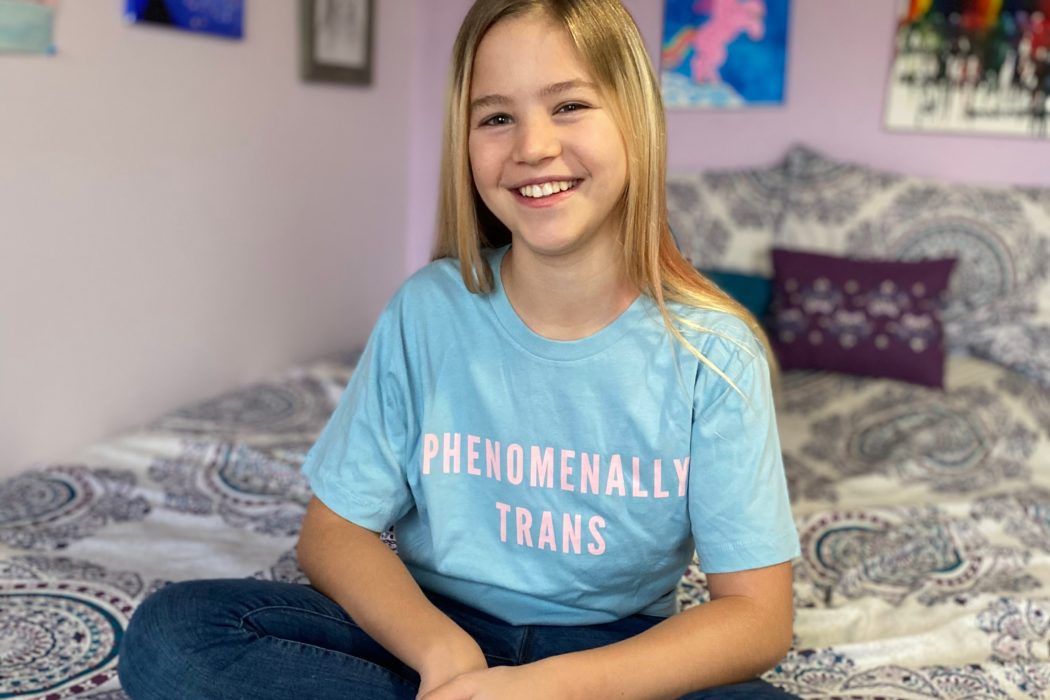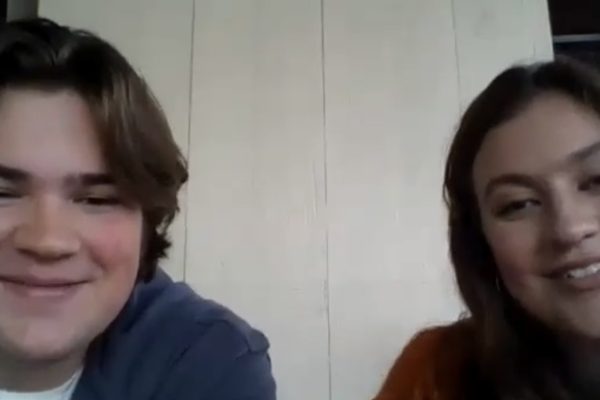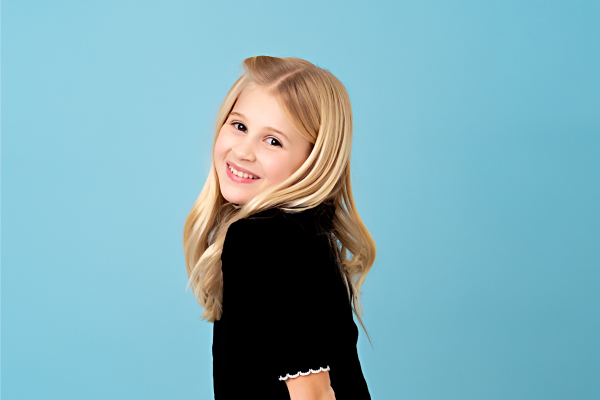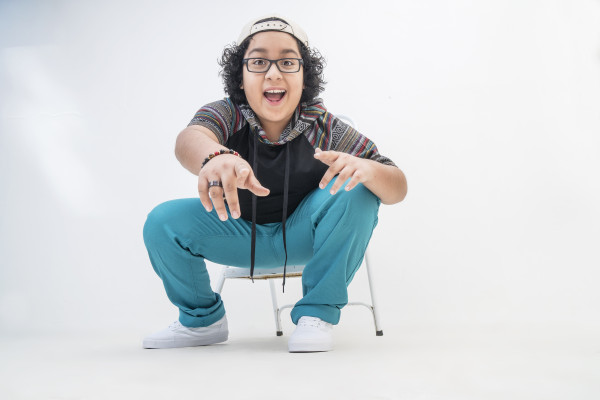When I hop on the phone with Rebekah Bruesehoff and her mother Jamie, one of the things we discuss is her love of cooking shows. (Her love of cooking shows is so abundant that when I ask her what’s her favorite one, she starts off with a laugh saying it’s a really hard question to answer.)
From what she can narrow down, she shares that she does love the Food Network ones, such as Kid’s Baking Championship, a show that long with Alton Brand’s Good Eats is one that she watches all the time with her dad. She also loves Great British Bake-Off. “I think I’m a pretty decent baker. I’m just not as good of a cook because I don’t do that as much. But it’s really fun to just bake and make really tasty treats,” she muses.
Another thing we discuss is that she’s a theater kid, both as a fan and doing shows. Some of her favorites are Hamilton, Mean Girls, Beetlejuice, and Heathers. “I would love to do any of those musicals but as for a part, I don’t really care, I just love being a part of the cast and getting to experience the whole theater thing,” she says in total drama kid fashion. So far, she’s played roles in Thoroughly Modern Milly, Footloose, Newsies, Damn Yankees, All Shook Up, and Beauty and the Beast.
We also talk about her love of dance and how dancing has impacted her life. She’s studied tap, ballet, and aerial arts with tap being one of her favorites among the three. (We both agree that the joy of tap is getting to make noise.) “Dance has really taught me determination. It takes work and dedication to make progress. And flexibility doesn’t come particularly easy to me and if I want to improve, I have to commit and be okay with being really bad for a little while,” she admits. “I think that’s a really good life lesson.”
It is a good life lesson. It’s also a lesson given by someone that is technically now a Marvel superhero thanks to the new Disney Plus series Marvel’s Hero Project. The docuseries follows a group of youth who are making positive changes across communities. All twenty episodes highlight a different young activist and their cause. For Rebekah, that means that her episode highlights her advocacy for LGBTQ youth.
Rebekah’s entrance into the Marvel Universe began when the producers reached out to Jamie about Rebekah being a part of a docuseries on kids making a difference. Rebekah recalls that they weren’t aware that the project had anything to do with Marvel or Disney until the end of filming. “I guess it didn’t really click in my brain,” she says when I ask her what her initial reaction was when realized she was now a part of Marvel. “I didn’t really get it until the episode really came out and that’s when it hit me and I was like, ‘Whoa, I’m an actual Marvel superhero,'” she laughs.
For each Hero featured on the show, we see their story and how they’re making a difference, then they’re presented with a jacket welcoming them to the Marvel Hero Project along with a comic book made by Marvel artists to showcase their superpower.
“In my comic that they made for me, I think my superpower is spreading a message of acceptance and showing people that LGBTQ youth are just like other kids, it’s really cool because that’s what I do in real life,” Rebekah shares excitement for how the Marvel comic reminds her that her dedication to spreading acceptance and hope is what makes her a superhero.
Like all superheroes (or just everyday people) work, there are pros and cons to the job. Rebekah describes it as a combination of good and hard. “Juggling everyday kids stuff and trying to make a difference in the world can be really stressful. Plus everyone sees the fun stuff that I do. They see pictures on social media of me going to events but there’s also the hard stuff–all the work, the pushback my family receives–it can be really hard,” she shares.
“When I first saw the other Hero Project episodes, I felt like, ‘Wow, they’re doing really important stuff,'” Rebekah continues noting that getting to see and learn from the other Hero Project kids and youth activists is an important reminder to keep going. “Seeing them and getting to know them has inspired me to not stop doing what I’m doing even when it’s really hard.”
As we see more youth activists gaining attention such as Mari Copeny standing against environmental racism as she fights for clean water in Flint, Michigan, Greta Thunberg fighting climate change, Malala Yousafzai working to provide young girls education, and multiple youth organizations that amplify Black, Brown, and/or LGBTQ+ youth voice, we also see adults scrambling to figure out how to respond.
“I want adults to know kids can make the same difference that adults can and maybe even more,” Rebekah states. She credits fellow Marvel Hero Project member Jordan Reeves for teaching her that youth don’t see the limitations that adults do. “We’re more willing to think outside the box and we don’t see problems as too big or too hard to solve. We just get to work solving it.”
I find joy in books because I get to escape the world that I’m in for a while. I also find joy in my friends because they’re such an important lifeline for me.
When Rebekah talks about her experiences as a youth activist and getting to be around other LGBTQ youth and activists, there always feels like a glimmer of hope in her voice. Or at least, ideas for improvement and something better. There’s a moment in Rebekah’s episode where her dad mentions that she’s always had a lot of joy, but that she would save it for places where she felt most comfortable.
When I ask her about where her comfort zone is now that she’s in the public spotlight more and getting to do the work that she does, she admits that it’s shifted. “I’ve definitely gotten more comfortable on stage and speaking in front of people. But it’s all still nerve-wracking. Especially those minutes or seconds leading up to going on stage. I’ve gotten more comfortable using my voice and not relying on my mom or the people around me to do it for me,” she explains.
I also ask her how does she find her joy with this new comfort zone. “I find joy in books because I get to escape the world that I’m in for a while. I also find joy in my friends because they’re such an important lifeline for me,” she reflects, quickly adding, “And getting out in nature is really important.”
(She notes that she loves fiction books and Becoming by Michelle Obama. At the time of our call, she was also reading Crown of Midnight by Sarah J. Maas for those wondering.)
Rebekah and Jamie have both openly talked about Rebekah’s experiences with mental health and struggling with depressive and suicidal thoughts at a young age because she didn’t have the language at the time to be aware that she was trans. Thankfully, Rebekah’s family took notice of what she was going through and instead of letting it go ignored or force her into a box that she wasn’t, Rebekah was allowed to attend gender therapy and Jamie explained to her what the identity “transgender” meant.
“When we look at the devastating rates of anxiety, depression, and suicide among LGBTQ youth, it’s terrifying. But then we look at the data on support and we can see that supporting and listening to trans youth saves lives,” Rebekah says. “We can also rely on basic child development. Little kids know their gender between the ages of 2 and 5 and that’s true not just for cisgender kids. Of course, not everyone comes out then or can explain it but it’s really cool that they can know who they are at such a young age. Some people just don’t have the vocabulary to express it to the world. Basically, we listen to people of all ages when they tell you who they are. They know themselves better than you can ever because you’re not in their head, in their shoes, or in their place in society.”
Basically, we listen to people of all ages when they tell you who they are. They know themselves better than you can ever because you’re not in their head, in their shoes, or in their place in society.
When it comes to looking out for and protecting people that don’t follow strict binaries that have been set, it’s important to realize that they’re not just that one identity and that everyone that carries that identity still exists differently from one another. Jamie mentions in Rebekah’s episode that often when we talk about issues, we forget the people behind them. As activists, it’s a tricky, but important tightrope to juggle highlighting social justice issues and change with reminding both yourself and others that you (and those directly affected by these issues) are human.
In terms of them personally feeling humanized instead of being sensationalized, Jamie and Rebekah say it comes from the one on one connections. “It’s too easy when we talk about things collectively to treat people like we’re all the same–like every family’s the same or like every LGBTQ person is the same when we’re all unique,” Jamie explains. “…Like what you see of Rebekah or of me or of our family in a 5-minute clip or in one interview or whatever is just one tiny part of us. I think that’s the most humanizing for sure.”
“Yeah and I find it really cool especially after events when I’m speaking to kids and being there with kids, they come up to me afterward and we just have conversations like kids would and it’s amazing to kinda get past the work stuff and just have friends because of this,” Rebekah adds.
When it comes to school, she says that her own school is doing great in making progress although, “as with every place” there’s more work to be done, “We just started a GSA (Gay/Straight Alliance) this year so that’s been really cool to see the other LGBTQ people in my school, and our school has great policies–the teachers are willing to learn and the guidance counselors are really good at talking about this kind of stuff.”
One of the important actions toward progress and safety for LGBTQ students in school is the incorporation of the LGBTQ community into curriculums. Currently, the only four states that require the history/community is taught are California, Colorado, Illinois, and Rebekah’s state New Jersey. When we discuss the law and our excitement for our states making the right choice in following the lead of the activists who fought to get the curriculum implemented in schools, she lets out a yay.
“The really cool thing about the New Jersey law is that it’s not just history, it’s all school disciplines. So that’s in our math problems, writing prompts, and even our art projects. But it’s definitely in history too. I’m super hopeful I get to learn more because if I were to be honest, I don’t know much about the history,” she admits. “While I do know more than most people do, there’s always more to learn. But, I’m excited to see LGBTQ people represented. This can make such an impact on LGBTQ students and their peers to be more accepting and just to see the accomplishments we can make in society.”
Similar to Illinois, New Jersey is planned to introduce their LGBTQ achievements curriculum in the 2020-2021 school year with a few pilot programs already in a few schools–something Rebekah is excited about because it gives schools a chance to make sure they’re teaching the curriculum properly and keeping LGBTQ youth safe and centered instead of “putting these kids in an odd place.”
“There’s certainly been pushback like you see whenever we have this progress,” Jamie chimes in sharing that it mostly has come from a misunderstanding and the assumption that teaching about LGBTQ achievements/history is the same as a sex-ed curriculum. “But the pushback has been, while loud, small in numbers.”
I mention that Illinois has been similar but that one of the most important things about these curriculums being included in schools is because members of the LGBTQ community have been influential in a lot of aspects of our history and lives and often when/if they’re taught in schools, that part of their humanity is ignored.
The two agree with Rebekah quickly adding, “And your kids might already know about it. Like, it’s such an important part of history they might have learned about it from a friend or even the internet.”
I’m excited to see LGBTQ people represented. This can make such an impact on LGBTQ students and their peers to be more accepting and just to see the accomplishments we can make in society.
From testifying in front of New Jersey legislators in support of this law to writing an op-ed about the importance of New Jersey’s Bab Siperstein Law (named after trans activist Bab Siperstein, this law allows trans, gender non-conforming, and intersex New Jerseyians to change the gender marker on their birth certificate to correctly reflect their gender) to speaking at multiple rallies and events, Rebekah has a lot of experience dealing with adults for a cause.
While she admits that sometimes adults seem more interested in hearing her parents share their experiences rather than hearing her, Rebekah says she’s realized that for the most part, they’ve taken an interest in her voice as well. Which is something that she’d like to clarify as being her voice and experience and not those of everyone else. “I find that I’m like, ‘Wait, I don’t know all the answers.’ That’s why it’s nice to do this as a team with my mom, but I’m the expert on me. I can’t speak to what my mom has gone through with this whole experience. I’ve been really impressed with adults and legislators I’ve worked with because they really want to hear from me and kids like me.”
She adds, “I also know that I’m very privileged: I’m white, I fit in gender boxes, and I have really supportive parents. So I want to help express that not all kids have the support I have and that we have to help them.”
“It’s nice that I see a lot of adults wanting to hear Rebekah’s voice and less from me because this is her experience certainly. What I find most tricky is that people sometimes just want that token young person to go talk to us so we can pat ourselves on the back and ‘Ooh’ and ‘Aah,'” Jamie follows up. “So it’s tricky to make sure they’re listening and really wanting to hear her voice and have that inform changes and not let it be a checkmark.”
In order to be cautious of that, Jamie says there’s an importance on focusing on long term relationships. She mentions that Rebekah is joining the GenderCool Project which is a youth-led national storytelling campaign centering on transgender and gender-expansive youth. “One of the cool things they do is they work with companies and corporations on like a long term basis so it’s not like a single event where they can check their diversity mark. They’re gonna engage with these young people and then they’re gonna do some work and then they’re gonna engage again peeling back those layers of what they need to learn,” Jamie explains. “So we’re trying to do that more in our individual work too: trying to do like ‘Here’s your 101, now let’s see how this plays out and let’s revisit it and see what’s next.'”
What’s next in Rebekah and Jamie’s individual work is advocating for the Every Child Deserves a Family Act which prohibits federally-funded child welfare service providers from discriminating against children, families, and individuals because of their religion, sex, sexual orientation, gender identity, and marital status. It also ensures that children and youth in foster care receive the identity-affirming, culturally competent care they deserve.
“I think it’s really important because every child deserves a family,” Rebekah puts it simply with Jamie adding, “Even the title of the act says it.”
“We know LGBTQ youth end up in foster care a lot when they’ve been rejected by their families just because of who they are. They’re really vulnerable and then they’re twice as likely to be mistreated in foster care. We need a system and laws that protect the most vulnerable of our citizens,” Rebekah continues. “This bill goes a long way towards doing that. It could also protect LGBTQ parents who want to foster or adopt and someday that could be me, so this is really important to me.”
The current steps needed for support of the bill according to Jamie is reaching out to legislators. “We’re at a place where we need folks to sign on as a co-sponsor to the bill because the more co-sponsors we have, the sooner we get voted on. Of course, everything feels really strange right now in our current pandemic situation, but still, bringing this up to legislators and keeping it on their radar and asking them to cosponsor is the key ask.”
~~~
You can stay up to date on all things Rebekah Bruesehoff by following her Twitter and Instagram accounts.
You can stay up to date on all things Jamie Bruesehoff by following her Twitter, Instagram, and Facebook accounts.
(photo cred: Jamie Bruesehoff)




